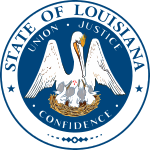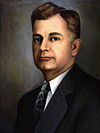Democratic primary
Campaign
Louisiana's reformist anti-Long faction supported Sam H. Jones, who had been governor from 1940 to 1944. Jones was endorsed by outgoing Governor Davis and high-profile Louisiana politicians, such as Senator John H. Overton and Mayor deLesseps Story Morrison Sr. of New Orleans, who controlled the city's powerful Crescent City Democratic Association. Jones's reform campaign was weakened by reminders of unethical deals and heavy-handed political tactics in his previous term and by the electorate's lack of enthusiasm for reform governors after eight years.
Sam Jones's main opponent was Long, who had been governor in 1939–40 and the inheritor of his brother Huey Long's Longite political faction. Funded by politicians, oil and gas money, and contributions from organized crime in the New Orleans area, Long ran a theatrical and entertaining campaign, making stump speeches that were a mix of political harangue and humorous anecdotes. His platform called for the elimination of Jones's civil service, the doubling of state spending on programs like pensions, school lunches, charity hospitals and asylums, new trade schools, pay increases for teachers, an increased homestead tax exemption, and bonuses for veterans of World War II. Through payoffs and promises of support, Long managed to gain the backing of powerful former enemies, State Senator Dudley LeBlanc, former Governor Jimmie Noe, and U.S. Representative F. Edward Hebert.
Robert F. Kennon drew most of his support from North Louisiana and reformers disillusioned with Jones. Jimmy Morrison (no relation to Mayor Morrison) was supported by former New Orleans mayor Robert Maestri and his Old Regular political machine and finished in fourth place.
Results
Jimmy Morrison was able to carry East Baton Rouge and several parishes in vicinity of his home region. Kennon won Shreveport's Caddo Parish and attracted some support in the rest of northern Louisiana. Support from deLesseps Morrison's machine allowed Jones to win in New Orleans, and respectable support from sections of the rest of the state sent him into the runoff round with Long. But Long's victories in most parishes in both northern and southern parts of the state gave him a commanding lead going into the second round.
Runoff
In the runoff, the Old Regulars threw their support behind Long. With his longtime enemies were supporting Long, Mayor Morrison stepped up his campaigning for Jones and began a feud with Long that would last until Long's death in 1960.
The runoff election saw Long elected to the governor's office with an overwhelming majority. Of Louisiana's 64 parishes, only East Baton Rouge and West Feliciana went for Jones. Jones even lost his home base of Calcasieu Parish. He did not seek the governorship again.

Earl Kemp Long was an American politician and the 45th governor of Louisiana, serving three nonconsecutive terms. Long, known as "Uncle Earl", connected with voters through his folksy demeanor and colorful oratory. He departed from other southern politicians of his time by promoting a progressive agenda, expanding school-lunch programs, teacher pay, public-works projects, and minority voting rights.
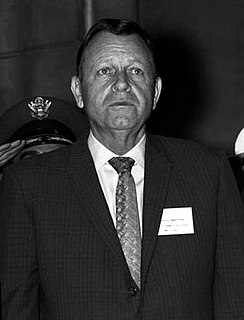
James Houston Davis was an American politician, singer and songwriter of both sacred and popular songs. Davis was elected for two nonconsecutive terms from 1944 to 1948 and from 1960 to 1964 as the governor of his native Louisiana. As Governor, Davis was an opponent of efforts to desegregate Louisiana.

deLesseps Story Morrison Sr., also known as Chep Morrison, was an American attorney and politician who was the 54th mayor of New Orleans, Louisiana, from 1946 to 1961. He then served as an appointee of U.S. President John F. Kennedy as the United States ambassador to the Organization of American States between 1961 and 1963.

Samuel Houston Jones was the 46th Governor of Louisiana for the term from 1940 to 1944. He defeated the renowned Earl Kemp Long in the 1940 Democratic runoff primary election. Eight years later, Long then in a reversal of 1940 defeated Jones in the 1948 party primary.

The 1944 Louisiana gubernatorial election was held in two rounds on January 18 and February 29, 1944. Like most Southern states between the Reconstruction Era and the Civil Rights Movement, Louisiana's Republican Party was virtually nonexistent in terms of electoral support. This meant that the two Democratic Party primaries held on these dates were the real contest over who would be governor. The 1944 election saw the reformer ‘anti-Long’ faction retain power for another four years under Jimmie Davis.

Robert Sidney Maestri was mayor of New Orleans from 1936 to 1946 and a key ally of Huey P. Long Jr. and Earl Kemp Long.

Lewis Lovering Morgan was an American lawyer and politician from Covington, Louisiana.

The New Orleans mayoral election of 1946 was held on January 22, 1946. It resulted in the defeat of incumbent mayor Robert Maestri and the election of deLesseps Morrison as Mayor of New Orleans.

The New Orleans mayoral election of 1958, held in February, resulted in the re-election of deLesseps Morrison to his fourth consecutive term as mayor of New Orleans. Morrison was able to defeat the Regular Democratic Organization candidate - former State Representative Claude W. Duke - soundly, winning 90,802 of the 157,320 votes cast in the election compared to Duke's 43,231 votes. State Representative Fred C. Donaldson ran a distant third with 18,999 votes; no runoff was required. Morrison had proven able to consistently defeat the once powerful RDO machine, but since mayors were only allowed two consecutive terms under the new city charter of 1954, this would be Morrison's last term in office.

The 1956 Louisiana gubernatorial election was held on January 17, 1956. Incumbent Governor Robert F. Kennon was ineligible to run for a second term in office. Earl K. Long won the Democratic primary, which was tantamount to election, securing his second full term as Governor of Louisiana. He received over 50% of the vote, defeating his opponents so soundly that no runoff vote was needed. His closest competitor was New Orleans mayor deLesseps Story Morrison.

The 1964 Louisiana gubernatorial election was held on March 3, 1964. Democrat John McKeithen won a highly-competitive primary and dispatched Republican Charlton Lyons in the general election, though Lyons made a historically good showing for a Louisiana Republican up to this point.

The 1960 Louisiana gubernatorial election was held on April 19, 1960.

The New Orleans mayoral election of 1950 was held on January 24, 1950. It resulted in the re-election of deLesseps Morrison to his second term as Mayor of New Orleans.

The 1940 Louisiana gubernatorial election was held in two rounds on January 16 and February 20, 1940. Like most Southern states between the Reconstruction Era and the Civil Rights Movement, Louisiana's Republican Party was virtually nonexistent in terms of electoral support. This meant that the two Democratic Party primaries held on these dates were the real contest over who would be governor. The election resulted in the narrow defeat of Earl K. Long and the election of Sam H. Jones as governor of Louisiana on a reform platform.
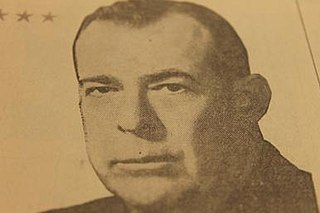
Clarence C. "Taddy" Aycock, a conservative Democrat from Franklin in St. Mary Parish, was the only three-term lieutenant governor in 20th century Louisiana history. He served from 1960 to 1972. Aycock failed in his only bid for governor in the 1971 Democratic primary. Few lieutenant governors in Louisiana have been elected directly to the governorship; former Governor Kathleen Babineaux Blanco of Lafayette, is a prominent exception.
Rufus D. Hayes was an attorney, judge, and businessman from Baton Rouge, Louisiana, who served as his state's insurance commissioner from 1957 to 1964. He was also a former district attorney in East Baton Rouge Parish and in 1958 the Louisiana Democratic state chairman. He was a delegate to the 1956 and 1960 Democratic National Conventions held in Chicago, Illinois, and Los Angeles, California, respectively.
Sidney Jackson McCrory was the Louisiana Commissioner of Agriculture and Forestry from 1956 to 1960 during the final term of his political ally, Governor Earl Long. He was also a key organizer in 1960 for the John F. Kennedy/Lyndon B. Johnson ticket, which handily carried Louisiana's then ten electoral votes.

Wellborn Jack, Sr., was an attorney from Shreveport, Louisiana, who was a Democratic member of the Louisiana House of Representatives from Caddo Parish serving from 1940 to 1964. He finished in sixth place for five at-large seats in the general election held on March 3, 1964.
Iris Turner Kelso was a Mississippi-born journalist who worked for three newspapers in New Orleans, Louisiana, including the New Orleans Times-Picayune.
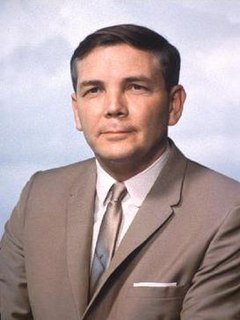
John Julian McKeithen was an American lawyer and politician who served as the 49th governor of Louisiana from 1964 to 1972.

